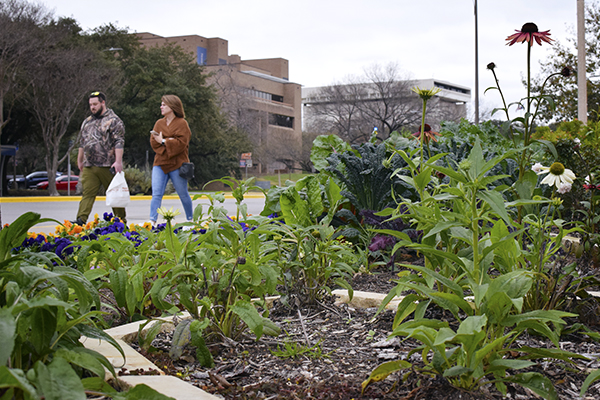Landscape Services plants annual crops, such as ornamental fruits and vegetables, during the winter to add aesthetic beauty to the most visible areas on campus, said Landscape Services horticulturist Ty Kasey.
“We picked many of the frilliest, most colorful varieties we could so that they would really pop to the eye, and it’d be a suitable replacement for just planting flowers,” Kasey said.
Students can find the largest displays of edible herbs and leafy greens in the upper tier of Littlefield Fountain, the Graduate School of Business Plaza and the northwest corner of the Darrell K Royal-Texas Memorial Stadium, Kasey said.
There are many fruit and nut trees across campus, including ornamental pomegranate, Mexican plum and pecan trees, said Jennifer Hrobar, supervisor of urban forestry for Landscape Services.
Hrobar said there are also a wide variety of fruit trees in the orchard by Waller Creek, including sour orange, sour kumquat, Mexican and Japanese plum, peach, fig, and pomegranate trees.
Kasey said because the campus belongs to the students, Landscape Services cannot prevent students from consuming the fruit and vegetables grown on campus. However, he said the group does not encourage people to participate in a “free-for-all.”
“We do know that some people help themselves, and we can’t stop that,” Kasey said. “In the end, it’s not really a problem per se if there’s nothing damaged.”
Hrobar said she posted signs in the orchard for people not to break branches or rip fruit off the trees. If the fruit is ripe and within easy reach, she said she welcomes people to take some and leave some for others.
“We want to have it there for everybody to enjoy,” Hrobar said.
However, students should be cautious of contamination if they choose to try the leafy greens planted on campus, Kasey said.
“One of the easiest ways to die (from) food poisoning is eating leafy greens,” Kasey said. “For all their health benefits, they’re a great way to food poison yourself.”
The leafy greens planted on campus are sourced from an organic vegetable grower in Williamson County, Kasey said. All organic fertilizer is used everywhere across campus except in the annual beds where the leafy greens are grown, he said.
Although the plants are sprayed with clean water, Kasey said because a stronger fertilizer is used, the plants are not 100% organic.
Computer science freshman Shikhar Gupta said he didn’t know edible plants were grown on campus. Gupta said he would be cautious if he were to try them because he doesn’t know exactly which plants are safe to eat.
“You have to advertise these are safe to eat or these are still growing because I don’t know enough to go up to a plant and pick it,” Gupta said.
If students are interested in learning about the plants on campus, Hrobar said they can visit the Landscape Services website for information.





















